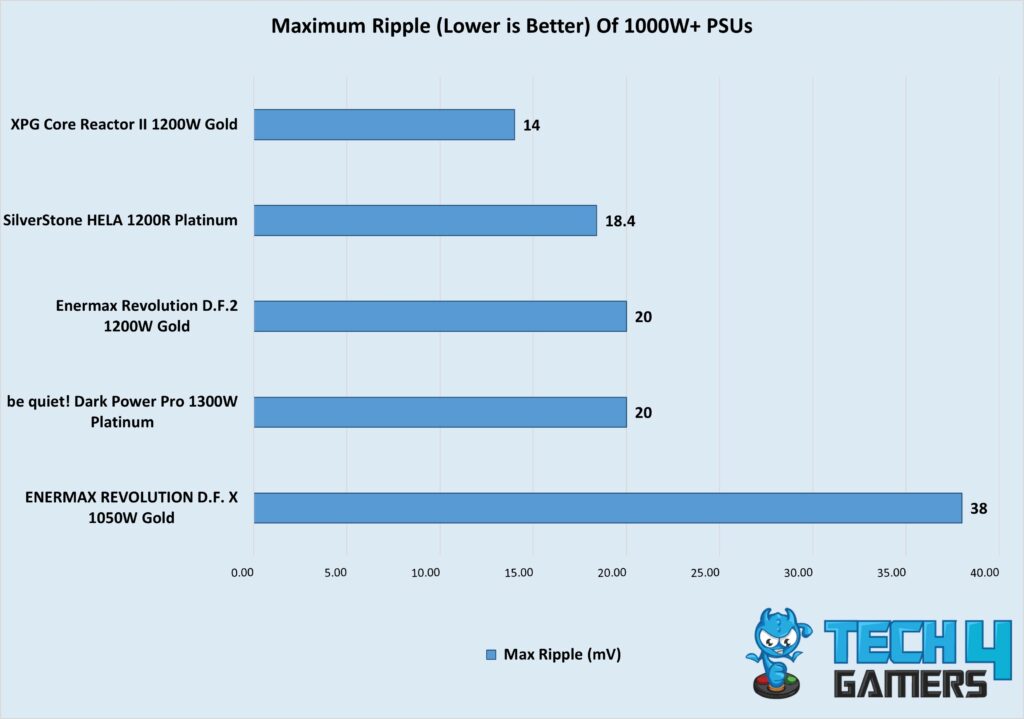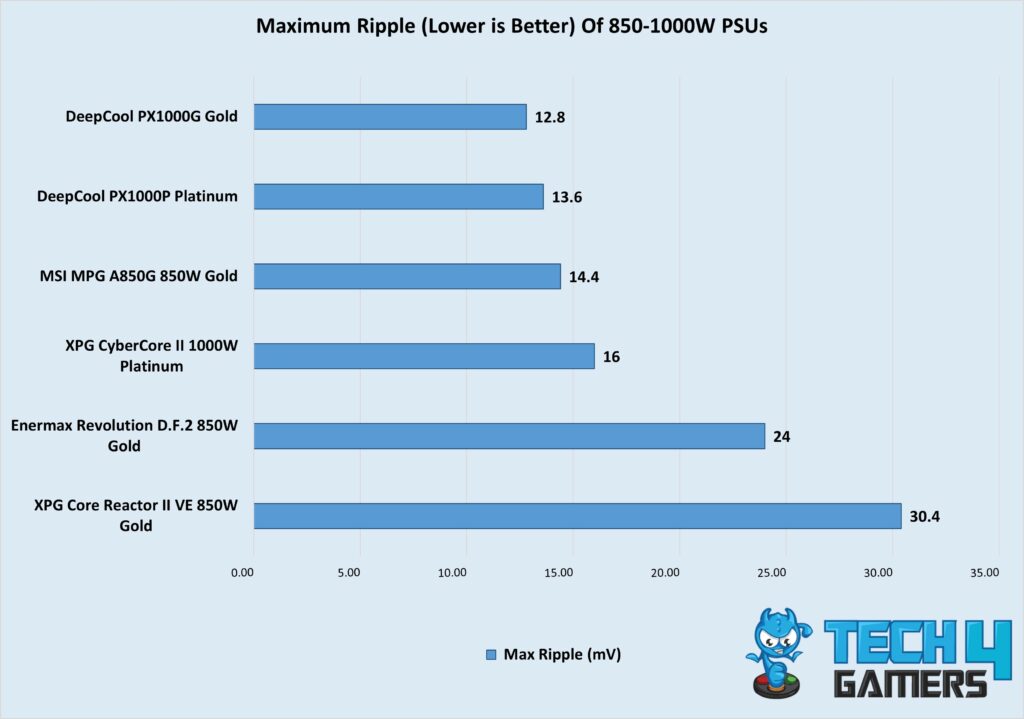Voltage ripple is a technical specification that casual users often overlook when they buy a PSU for their system. Yes, it plays a crucial role in your PC’s overall performance. PSU voltage ripple has more significance, especially if you’re an overclocker or an enthusiast.
Key Takeaways
- Voltage ripple in a PSU is the unwanted fluctuation in the DC voltage output, which means an AC component is present.
- Lower voltage ripple is crucial for system performance. Otherwise, it can cause system failure and become a hurdle in overclocking.
- High-quality power supplies have voltage ripples lower than 20 mV, but below 30 mV are also acceptable for 12V PSU rails.
What Is PSU Voltage Ripple?
A PSU voltage ripple is the unwanted fluctuation in the DC voltage output of a power supply unit. We can also say that the output power has an AC component[1].
However, due to the nature of AC-DC conversion, slight variations in voltage always occur[2]. These fluctuations are measured in millivolts (mV), the difference between the highest and the lowest voltage points in the cycle[3].

Why Does PSU Voltage Ripple Matter?
The voltage ripple might seem like a minor specification, but it drastically impacts your PC performance. Here’s why:
- Stability: The higher voltage ripple can stress the sensitive components of your PC, such as your CPU and GPU. Premature component failure, crashes, and instability may occur due to voltage ripple.
- Overclocking: As you know, overclocking involves pushing the component beyond its default factory setting, so it requires a stable and potent PSU. Higher voltage ripple can sabotage overclocking and limit the maximum stable frequencies.
What Is Good Ripple Performance?
According to the ATX specifications[4], the ideal voltage ripple for:
- 12V rails have a maximum of 120 mV peak-to-peak and for the
- 3.3V and 5V rails, the ripple is a maximum of 50 mV.
However, this is a rather far-fetched case. In fact, as per our testing, a high-end stable PSU will showcase a maximum ripple of below 20 mV, while a decent (average) PSU can have up to 30 mV of voltage ripple. Take a look at some of our test results:
Helpful Resources By Tech4Gamers:
References:
- POWER SUPPLY BASICS – Wavelength Electronics. (n.d.). https://www.teamwavelength.com/power-supply-basics
- Understanding AC/DC Power Supply | Article | MPS. (n.d.). https://www.monolithicpower.com/en/ac-dc-power-supply-basics
- Lee, Y. S., & Chow, M. H. (2011, January 1). Diode Rectifiers. Elsevier eBooks. https://doi.org/10.1016/b978-0-12-382036-5.00010-0
- INTEL – ATX Specification (n.d.). https://edc.intel.com/content/www/us/en/design/ipla/software-development-platforms/client/platforms/alder-lake-desktop/atx-version-3-0-multi-rail-desktop-platform-power-supply-design-guide/2.0/2.01/output-ripple-noise-required/
Frequently Asked Questions
The ripple voltage in a PSU is simply a residual periodic variation or fluctuation in the DC voltage.
Considering the actual scenarios, the ripple lower than 30mV in the PSUs is acceptable. However, ATX specifications have a maximum limit of 120 mV.
You can reduce the voltage ripple in your PSU by stabilizing the AC frequency and load. However, you can’t directly modify the specifications, so buy a good PSU instead.
Thank you! Please share your positive feedback. 🔋
How could we improve this post? Please Help us. 😔
[Errors Troubleshooting Expert]
Arsalan Shakil (aka GuyThatDoesEverything on YouTube) is a PC Tech Enthusiast and Electronic Geek. With over 10+ years of experience in Electronics, he then decided to explore Software Engineering to design embedded products and automate existing hardware solutions.
When he started tearing down old cameras to understand how they worked, he was shocked (literally, when he got zapped by a flash discharge capacitor), giving him the power (debatable) to fall in love with videography/photography. He also started making some fun videos that later became YouTube tech reviews.
Skills:
- 10+ years of experience in Electronics design, embedded solutions, and prototyping
- Majored in Software Engineering
- Research paper publication in IEEE for Embedded Military Uniform & LoRa WAN wireless technology
- Specialized in IoT Solutions
- PC Enthusiast & PC Modder
In his local region, he’s known to expose cheap PSU brands, often claiming fake certification or false claims on the box. He’s a true nerd and needed some friends in his life. Then he met some guys who work at Tech4Gamers, and they also came out to be equal nerds who suggested he join Tech4Gamers as a Hardware Expert.
 Threads
Threads








